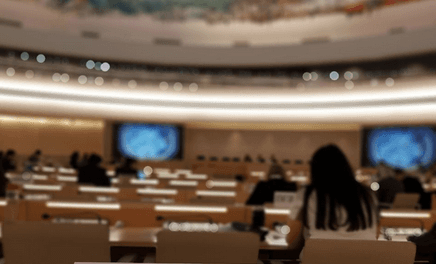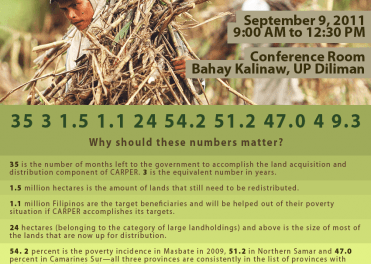In 2011, Olivier de Schutter, then UN Special Rapporteur on the Right to Food cautioned, “The commodification of land, which the global phenomenon of land-grabbing is accelerating, entails risks that go far beyond what the current proposals for regulating it seem willing to recognize.” The risks he alluded to stem from treating land, labour and money as mere tradable commodities and allowing market mechanisms to be the sole arbiter of society, culture and nature. Adequately addressing them would require subordinating markets to the interests of society and the natural environment, recognizing non commoditized valuations of land and nature in ‘official’ governance discourse and practice, and putting in place national and international regulations that stop rather than encourage land grabbing.
Private and state enclosures of lands, forests and water, now generally referred to as land, water and resource grabbing, are not new phenomena; struggles for control over the ownership, use, management and governance of land, water, territory and their associated wealth are central motifs in colonial and other national histories. Nor has land ever been out of markets: what grows naturally on land, what is grown by humans on land, what flows on and under land, what forms landscapes and eco-systems, what is built on land, and what is extracted from under the land, have all been commodities in some market or the other over the past centuries.
What is new about the current era of enclosures is the array of means, mechanisms and instruments by which political and economic control over land and nature are exercised, and by which land and land-based wealth are becoming commodities in new markets. Developing countries with large agrarian economies have thrown their borders open to foreign direct investment (FDI) in the agricultural and natural resource sectors, ostensibly to spur economic growth and create employment. Many of these investments are backed by complex financing arrangements and multiple sources of capital, including public, private and multilateral financiers.
The spread of neoliberalism in much of the world since the 1980s provided new impetus to the corporate capture of agriculture and food systems through vertically integrated value chains that included land, labour, inputs, credit, processing, distribution and retailing. Financial deregulation allowed commodity markets to expand rapidly and into new areas through new financial instruments, and also allowed new actors to enter the land-agricultural-food investment arenas. Investment banks created new types of investment instruments such as commodity index funds that amalgamated agricultural commodities, lands, minerals and energy futures, and directed floods of unregulated investment capital towards land and nature. Many agricultural derivatives transformed risk itself into a new assets class, thus increasing the volatility of commodity prices and economic uncertainty for small-scale agricultural producers who had no protection against market risks.
Over the past 10 years, sovereign wealth funds, private equity firms, insurance companies, pension and hedge funds, investment banks and other finance corporations have become implicated in land, forest, mineral and water deals as financial underwriters as well as direct investors. While land itself is immovable, financialization enables the wealth that springs from it to move across the world and be traded in distant markets. Natural, ecological, social, cultural, nutritional, health and even economic values associated with land are reduced to exchangeable financial instruments (such as derivatives) and a single landscape can be subjected to more than one financialization scheme, for example, Payment for Ecosystem Services (PES), forest carbon trading and a fast-growing tree plantation.
The subversion of rights, regulation and governance
Land, water and resource grabbing are human rights violations and have far reaching negative impacts on environmental quality, biodiversity, society, culture, employment, livelihoods, health and local peoples’ access to basic/essential goods and services. Promises made by investors to affected communities of providing employment, schools, health and other social services rarely materialize; jobs are poorly paid, precarious, often with unsafe work conditions, and distress out-migration is common. Local populations are robbed of their agency to make decisions about how to use, manage and govern their lands and territories, and of their ability to participate in political processes as migrants. Those who resist the incursions on their lands and territories face violent threats, intimidation, arbitrary arrests and incarceration, extra-judicial killings and enforced disappearance.
States enable these enclosures by enacting policies, laws and regulations that favor markets and by using their legal and security apparatus to suppress and punish those who resist. International financial institutions (IFIs), multilateral agencies, international policy institutions, transnational corporations (TNCs) and even some civil society organisations (CSOs) have sought to re-frame and re-present land, water and resource grabbing as “win-win” investments whereby investors can secure the assets they covet by meeting conditions outlined in voluntary codes of conduct to minimize negative impacts. IFIs—for example the World Bank, the International Finance Corporation (part of the World Bank group) and the Asian Development Bank (ADB)–provide financing, policy advice and technical support to governments and private firms sector actors for investments in agriculture, infrastructure, energy, urban development, and extractive industry, which demand secure access by investors to land, water and natural resources.
The World Bank has played a central role in promoting land markets in developing countries by financing land tenure administration reforms that established private property regimes, eased land transactions and enabled wealthy and powerful individuals to use land for financial and speculative gain. Anticipating water shortages as Asian economies intensify their pursuit of economic growth, the ADB has proposed a comprehensive framework for water governance that promotes water markets, water trade and increased private investment in water services and infrastructure. The Green Economy, elaborated by the United Nations Environment Programme (UNEP) in 2011 with the support of multilateral agencies, IFIs, states, private sector and environmental organisations, further advances financialisation by proposing a system of natural resource appropriation and commodification whereby eco-systems and biodiversity are valued in monetary terms rather than the varieties of life they sustain. The Green Economy treats nature, its functions and its capacities as “natural capital,” and aims to estimate appropriate economic values for the vital eco-system services that forests, trees, lakes, wetlands and river basins provide by capturing and storing carbon, creating water catchments, ensuring the stability of water cycles, soil fertility, local micro-climates for safe habitats, nurturing and regenerating biodiversity (including fisheries), etc. These values are considered crucial components of a country’s “natural capital,” and can be packaged and traded in international markets to attract investment and development finance.
The capture of land, forests, water sources and minerals are justified by states and many policy actors through narratives of global hunger and food scarcity, classifying lands as “idle, empty or under-used,” energy needs to meet development goals, tackling climate change and even environmental protection as described by journalist John Vidal in the “The great green land grab.” In order to satisfy commodity, food, energy, finance and conservation markets, the rights of local communities and populations to make decisions about the use, management and governance of lands and eco systems that sustain them are wrested away and replaced by regulatory regimes that enable commodification and financialization. Proposals to regulate land and nature based investments promoted by the World Bank, ADB and other IFIs, G-7/8, International Land Coalition and similar alliances do not aim to stop the commodification of land and nature. Rather, they provide conditions by which medium and large-scale investors can acquire land and associated resources with veneers of responsibility, transparency, democracy and participation. Voluntary codes of conduct may bring about some welcome changes in the way investments proceed but the actual facts of land and resource grabs will continue.
Rethinking governance
For those whose lives, livelihoods, cultures, societies and identities are turned upside down by destructive investments, land and resource grabbing cannot be regulated; they must be unconditionally stopped. The discourse and practice of governance must be reoriented to prioritize the rights of local populations and communities while respecting nature and the carrying capacity of earth. “Keeping Land Local: Reclaiming Governance from the Market” explores some of the challenges facing peasants, farmers, forest dwellers, fisher-folk, pastoralists, indigenous peoples and other local communities in their efforts to build systems for the governance of land, water, forests and territories that are just, participatory, ecologically sound and foster genuinely sustainable forms of living.
Shalmali Guttal is Coordinator, Defending the Commons Programme, at Focus on the Global South. She is one of the editors of Keeping Land Local: Reclaiming Governance from the Market, publication for which she also authored the introduction.








